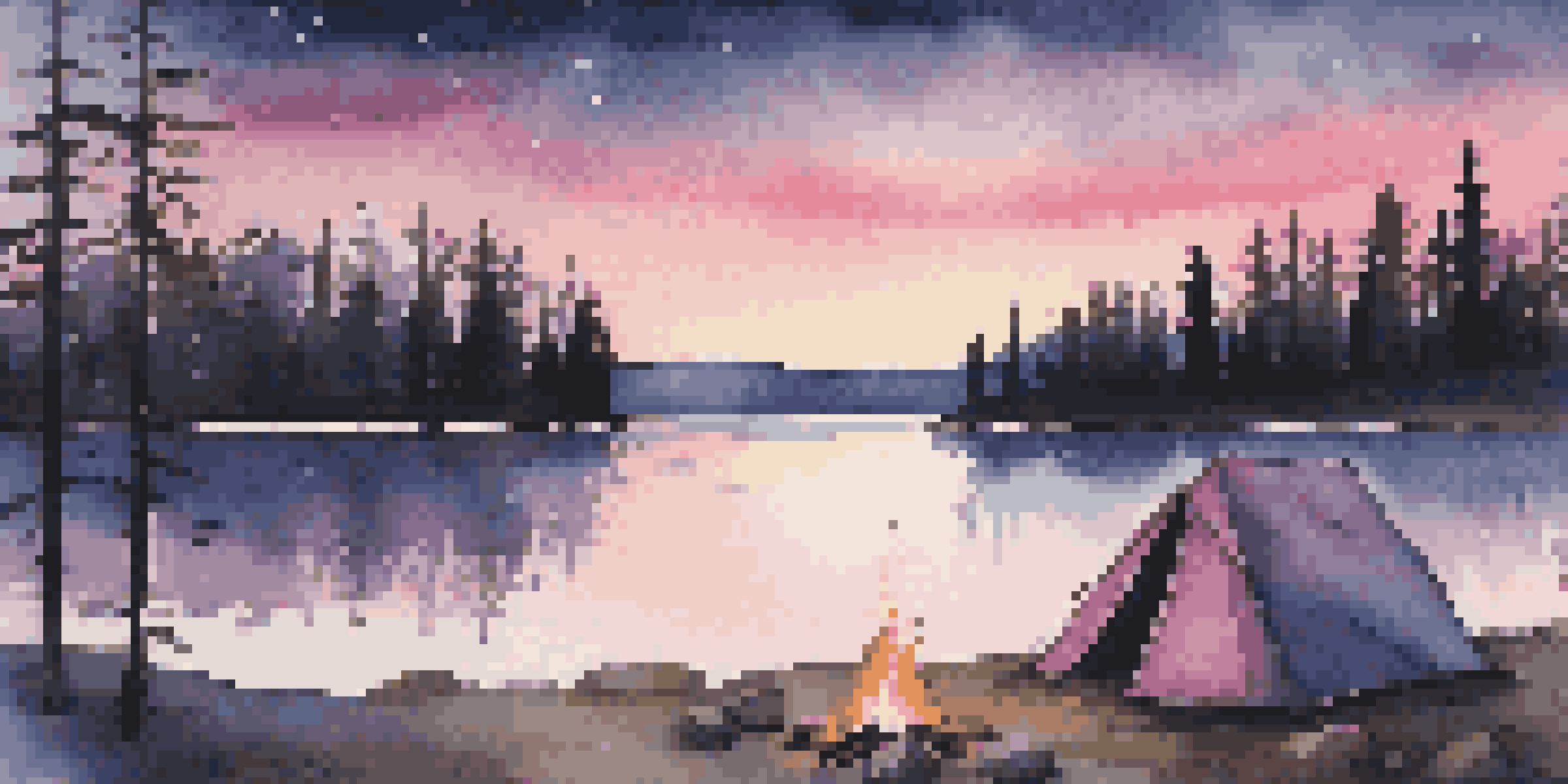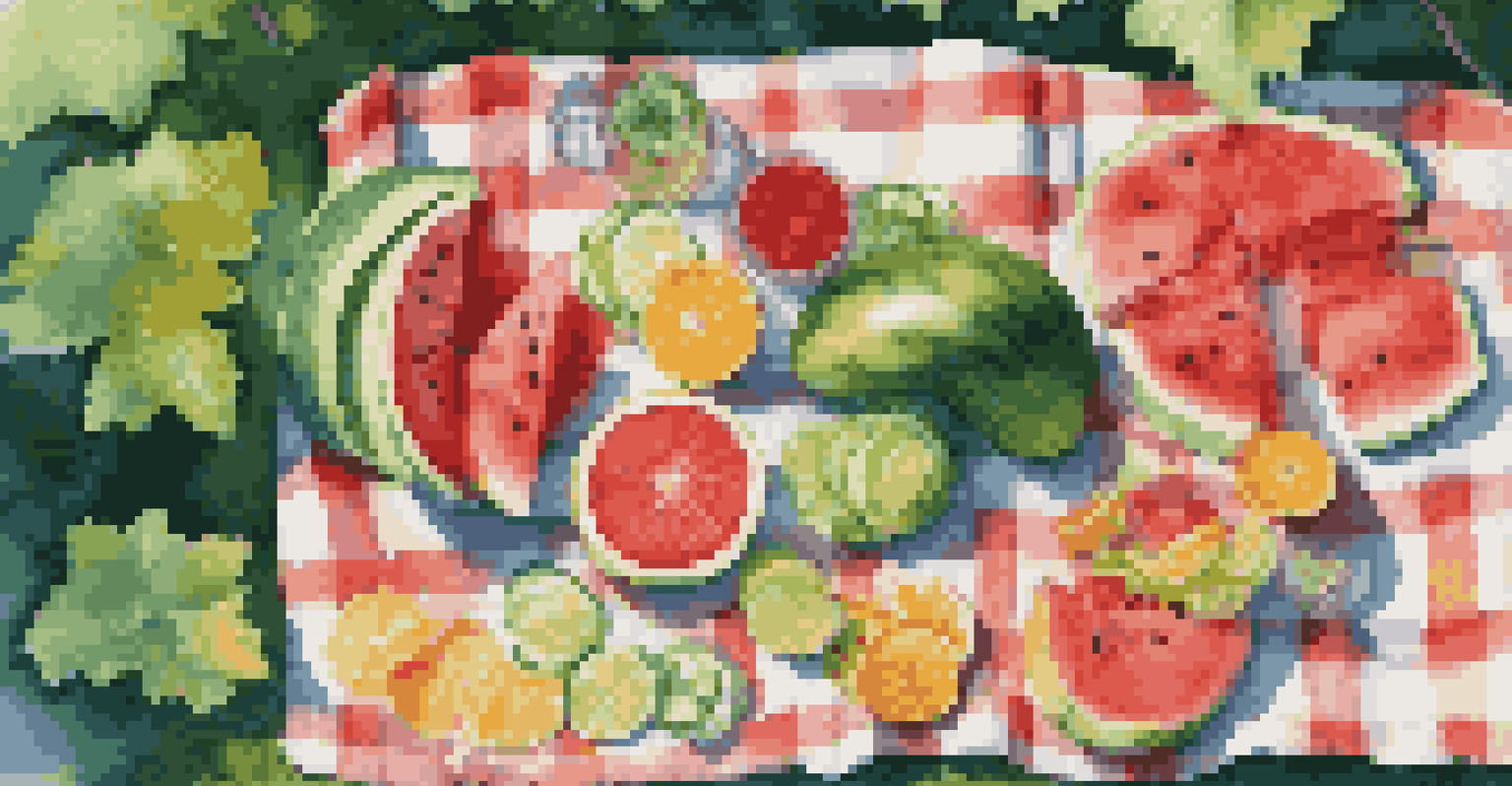The Importance of Hydration: Staying Safe While Camping

Understanding the Role of Hydration in Camping Safety
When you're out in nature, staying hydrated is crucial for your overall safety and well-being. Dehydration can sneak up on you, especially during physical activities like hiking or setting up camp. Understanding how hydration affects your body can help you recognize the signs of dehydration and take action before it becomes a serious issue.
Water is the source of life, and it is our responsibility to make sure we have enough of it to sustain us during outdoor adventures.
Water is essential for maintaining body temperature, joint lubrication, and nutrient transport—an important trio for any camper. If you’re feeling fatigued or dizzy, it could be your body’s way of signaling that you need more fluids. By knowing these signs, you can be proactive rather than reactive when it comes to your hydration needs.
Additionally, being in a hot or dry environment can increase your fluid requirements significantly. Therefore, having a solid understanding of how hydration works can help you plan better and enjoy your camping experience without health risks.
Signs of Dehydration to Watch Out For While Camping
Recognizing the early signs of dehydration is key to staying safe during your camping trip. Common indicators include dry mouth, fatigue, and dark-colored urine. If you notice these symptoms, it’s a good idea to pause your activities and drink some water.

As dehydration progresses, symptoms can worsen, leading to confusion, dizziness, and even heat exhaustion. This is particularly important while camping, where access to help may be limited. Paying attention to your body and being aware of how you feel can make all the difference in avoiding more severe complications.
Hydration is Key for Camping Safety
Staying hydrated is essential for your well-being while camping, as dehydration can lead to serious health issues.
Always remember, it's better to drink small amounts of water consistently rather than waiting until you feel thirsty. Thirst is actually a late sign of dehydration, so make it a habit to hydrate regularly, especially during strenuous activities.
How Much Water Should You Drink While Camping?
A common guideline is to drink about half a gallon (or 2 liters) of water per day while camping, but this can vary depending on your activity level and the environment. If you’re hiking or engaging in strenuous activities, you may need even more to stay properly hydrated. Listening to your body is crucial here.
Dehydration is a silent killer; it creeps up on you when you least expect it, especially when you're enjoying the great outdoors.
It's also important to consider factors like heat, humidity, and altitude, all of which can affect hydration needs. For instance, if you're camping in a hot climate, you might sweat more, which means you'll need to replenish those lost fluids. Similarly, at higher altitudes, your body can lose moisture at a faster rate.
To make it easier, you can carry a reusable water bottle and keep it filled throughout the day. Setting reminders to take a sip can also help maintain your hydration levels, ensuring you stay safe and energized during your adventures.
Tips for Finding Clean Water Sources While Camping
Finding clean water sources is essential for staying hydrated while camping. Natural water sources like rivers, lakes, or streams can provide you with the hydration you need, but it's crucial to ensure that the water is safe to drink. Always look for flowing water, as stagnant water is more likely to be contaminated.
You can also use water filters or purification tablets to treat water from natural sources, providing peace of mind while you hydrate. Portable filters or UV purifiers are lightweight and can easily fit in your camping gear. Having a reliable method for purifying water can make a significant difference in your camping experience.
Recognize Dehydration Symptoms Early
Being aware of early signs of dehydration, such as dry mouth and fatigue, can help you take action before it escalates.
Additionally, you can plan your camping location near established campsites, which often have potable water available. Researching your camping area ahead of time can save you from potential hydration hazards and help you enjoy the great outdoors worry-free.
Hydration During Meals: Foods That Help
Eating hydrating foods during your camping meals can complement your water intake nicely. Foods like fruits and vegetables—think watermelon, cucumbers, and oranges—are packed with water and can keep you refreshed. Including these in your meals can help you stay hydrated without relying solely on drinking water.
Snacking on hydrating foods can also be a fun way to keep your energy levels up while enjoying the great outdoors. Consider packing items like trail mix with nuts and dried fruits, or prepare meals that incorporate fresh veggies. This not only adds variety to your diet but also boosts hydration.
Don't forget that cooking methods can also impact hydration. Soups and stews made with water-rich ingredients can be delicious and beneficial for hydration. Planning meals that consider both nutrition and hydration can enhance your camping experience.
The Importance of Hydration for Kids While Camping
When camping with kids, keeping them hydrated is even more critical. Children can easily become dehydrated, especially if they're playing outside and running around. Setting a routine for water breaks can help ensure they drink enough fluids throughout the day.
Using fun containers or flavoring water with fruit can make hydration more appealing to kids. Encourage them to drink water regularly, especially during activities like hiking or playing games. It’s a simple step that can go a long way in preventing dehydration.
Plan for Water Needs on Trips
Properly planning your water intake and sources is crucial for multi-day camping trips to ensure you stay hydrated and healthy.
Also, educate them on the importance of hydration. Teaching kids about how their bodies work can empower them to take charge of their health. Making hydration a fun part of the camping experience can help instill healthy habits for the future.
Planning Ahead: How to Stay Hydrated on Multi-Day Trips
Planning hydration for multi-day camping trips requires a bit more strategy. First, consider how much water you’ll need based on your itinerary and activities. A good rule of thumb is to plan for at least 2 liters of water per person per day, adjusting as necessary for exertion levels.
Next, think about how you will store and transport this water. Collapsible containers or hydration packs can be great options for saving space. It's also wise to check the availability of water sources along your route, ensuring you have a backup plan if you run low.

Lastly, always pack extra water if you can, especially in remote areas. Staying prepared can make your trip more enjoyable and safe, allowing you to focus on the beauty of nature rather than worrying about hydration.